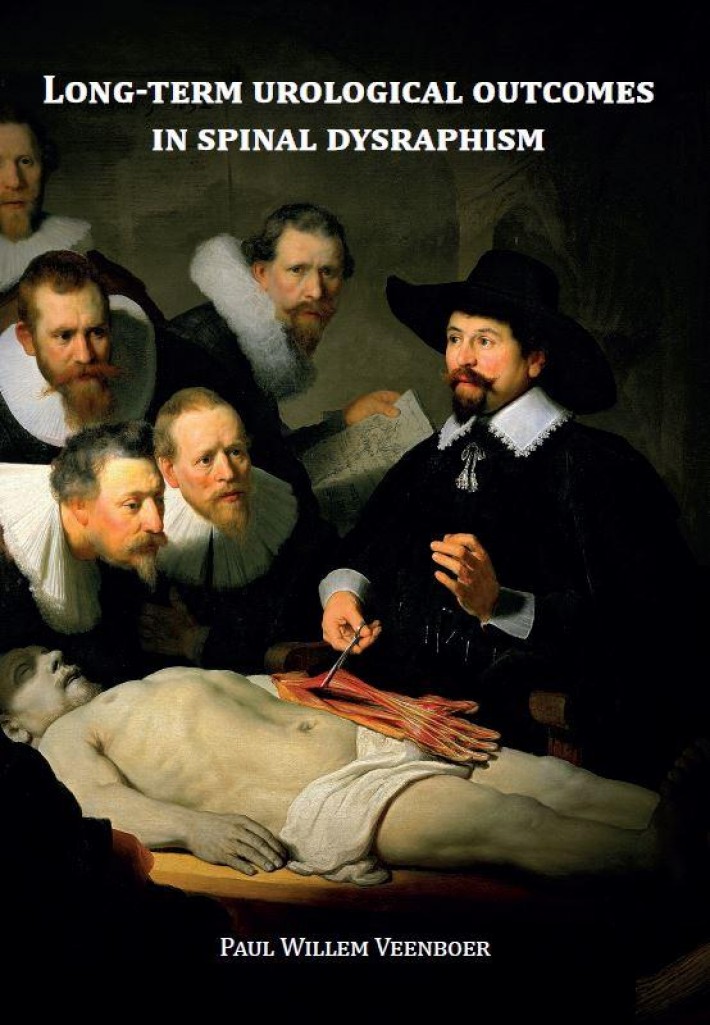dit werk kent de volgende uitvoeringen
Paperback
ISBN9789088918421
verschijningsdatum24/04/2014
verschijningsdatum24/04/2014

About the thesis
Spinal dysraphism (SD) is a common name for a group of heterogeneous congenital conditions of the central nervous system, of which myelomeningocele is the most well-known form. SD has a wide spectrum of symptoms, mainly caused by neurological deficits. The bladder and pelvic floor are also affected often and problems with bladder and pelvic floor may give rise to renal damage or even failure. SD is mostly readily apparent at birth and are followed-up intensly during childhood. After the age of 18, however, many SD-patients disappear from regular follow-up. Literature on adult SD-patients is rare and it is relatively unknown what the long-term outcomes of treatments initiated during childhood are. Moreover, it is also unknown of which modalities follow-up of these patients should exist (although some recommendations are made in existing Guidelines, these are hardly being followed and are not evidence based). This thesis studies 1) what is known in the literature about upper and urinary tract outcomes in SD-patients, 2) what outcomes of treatments from the childhood period are; 3) what the outcomes with regard to bladder- and kidney dysfunction are in various subgroups of SD-patients, as well as of other organ systems; 4); with which modalities urological follow-up should be organized. The studies were done using patient data from a prospectively made dataset, retrospective cohort studies and interviews with patients and caregivers.
About the author
Paul Willem Veenboer is geboren op 29 oktober 1986 in Badhoevedorp. Hij bezocht de basisschool in Hoogmade en Leusden. Het middelbaar onderwijs werd gevolgd aan Scholengemeenschap de Amersfoortse Berg in Amersfoort, alwaar hij tussen 1999 en 2005 naar het atheneum ging.
Na het VWO ging hij geneeskunde studeren aan de Universiteit Utrecht. Zijn propedeuse behaalde hij cum laude in 2006. In het vierde jaar deed hij een keuzecoschap urologie in het Diakonessenhuis (ook in Utrecht). Sindsdien is Paul overtuigd van het feit dat hij uroloog wil worden. Hij heeft in het vierde, vijfde en zesde jaar van de geneeskundestudie dan ook meerdere onderzoekjes en keuzecoschappen, waaronder de semi-artsstage, aan de urologie gewijd. Tijdens de wetenschapsstage in het zesde jaar werd begonnen met dit proefschrift.
In 2011 studeerde hij cum laude af, waarna hij korte tijd een klinische baan op de afdeling urologie van het UMC Utrecht had. Hierna werd aangevangen met een dubbelbaan: enerzijds die van arts-onderzoeker waarbij aan dit proefschrift werd gewerkt, anderzijds die van facilitator van de Richtlijn Urine-incontinentie voor de Tweede- en Derdelijnszorg. De Richtlijn is inmiddels gepubliceerd en aan de update wordt gewerkt.
Paul is sinds oktober 2013 weer werkzaam als consulent, zaalarts en SEH-arts voor de urologie in het UMC Utrecht. In zijn vrije tijd drumt hij en speelt hij gitaar. Daarnaast wordt er gesport (nihon jiu-jitsu, hardlopen) en gereisd.